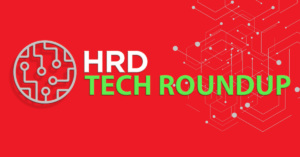HR technology in 2020: is now the time to invest?
- 6 Min Read
The implementation of technology in business has increased rapidly over the years, but with the disruption that has occurred in 2020, this has become a corporate imperative. With insight from HRD Thought Leader Terence Mauri, we took a closer look at the urgent need for HR technology and how to kickstart this process.
- Author: Sam Alberti
- Date published: Sep 9, 2020
- Categories

“Technology provides the foundation to modernize HR for ways that people want to work and for what the business needs,” reads PWC’s latest HR technology survey.
To a certain degree this has always been the case – the first commercial availability of computers in the early 1990s, for instance, was undoubtedly a monumental event on the corporate timeline. But in 2020, this rings true more than ever before. In recent times, the world of work has undergone what has been arguably the most seismic shift for generations.
Whether it be talent, employee experience, or wellbeing, scarcely a single aspect of the business world has been left unaffected by this large-scale disruption. Businesses must respond by pivoting appropriately, and though this will be a multifaceted process, technology may be the beacon that lights the way.
The survey goes on to demonstrate this, identifying “the big six issues driving HR technology decisions” based on responses from 600 HR leaders. For instance, 58% cited attracting and retaining talent, 42% cited improving employee experience, 38% cited workforce planning, and 34% cited ensuring wellbeing, diversity, and inclusivity.
The obvious deduction is that the events of 2020 have brought about an increased need for technology in the world of business. We took a closer look.
No longer optional for businesses
This is something that organizations simply must come to terms with in 2020. In the past, many businesses (particularly SMEs) have shown a reluctance to invest and evolve when it comes to technology, but 2020’s disruptive environment may have been the final push that was needed.
Offering us some added insight was Terence Mauri, global disruption thinker and HRD Thought Leader, who explained why the future is now for HR leaders and what the main use cases of technology will be in months and years to come.
He said: “Leaders must quickly pivot in order to embrace the change and generate success. Your job is now to scale intelligence, not just efficiency, and this means retooling needs to happen throughout the organization.”
Countless enterprises have begun such undertakings since the outbreak of coronavirus. For instance, multinational oil and gas company Royal Dutch Shell announced back in April that it would be collaborating with online learning platform Udacity to digitally train workers using artificial intelligence.
What’s more, the use of predictive analytics has nearly quadrupled in five years, and the use of metrics on pay inequities and total rewards usage has more than doubled.
This is a prime example of one of technology’s main uses for organizations in 2020 and beyond. Mauri went on to offer some further commentary on this.
He said: “Technologies such as AI, automation and predictive analytics are gathering momentum. The next wave of maturity requires HR leaders to lean into structured analytics so that it can answer key strategic questions.
“For example: in a downturn, which strategy offers the best chance of maintaining performance? Which departments could deliver a similar level of output with more contingent staff? Where should we locate talent hubs to take advantage of skilled talent pools? These are key questions that can be answered.
“Furthermore, exploring relevant metrics and sharing them with employees shows how the new climate of remote working affects productivity.”
Justifying the investment
Whilst it may be difficult to dispute the importance of HR technology in 2020, the financial element is a common impasse.
In this sense, COVID-19 has adversely impacted organizations across the globe. In fact, McKinsey provided some commentary on this scenario in an August report, showing that discretionary spending has plummeted by as much as 90% in some sectors.
In many cases overheads will be cut to the bare essentials, and based on this, HR leaders must be confident that retooling initiatives can be justified to the C-suite.
Mauri once again gave his views, explaining why such initiatives are essential to “accelerate transformation.”
He said: “No organization wants to lose the war for talent. Every leader is saying they want to accelerate transformation this year, and almost all are reporting significant skills gaps.
“The C-suite regards reskilling as the top talent investment capable of driving business success, and technology will be the enabler for this. As disruption accelerates and business models decay at a faster rate, HR leaders can guide the C-suite in terms of business continuity and organizational resilience by asking some key questions.”
Terence went on to cite some of these questions, including: ‘Will our work models attract new generations?’; ‘Are existing practices agile enough to withstand future waves of disruption?’; and ‘How do we incentivize transformation and make our talent future-ready?’.
But if the current outlook is any indicator, making the case to the CFO shouldn’t be a difficult affair. Workforce capability and lack of future skills are seen as primary reasons why 70% of transformations fail, amounting to over £900 billion in wasted investment.
What’s more, the race to reskill is one of the top investments leaders hope to maintain in a downturn, and yet just 34% of HR leaders are investing in workforce learning and reskilling as part of their future of work strategy.
Where to start for HR leaders?
This is always the eternal question. The business world evolves at such a pace that it can be hard for leaders to keep up. Many don’t know which way to turn, and this is especially true when it comes to technology; a notoriously daunting area to broach.
We posed this problem to Mauri, who responded by offering some final thoughts as to how HR leaders can get the ball rolling in understanding and implementing new technologies in 2020 and beyond.
He said: “One in three employees believe their job will not exist in a few years due to AI and automation. With so many unknowns, how can companies, individuals and society as a whole win? Now is not the time to adopt a ‘wait and see’ strategy. As agents of change, HR leaders need a more expansive view of their organization’s responsibilities and must work together to ensure people thrive now and in the future.
“HR leaders must stop and ask: ‘Is today’s approach to work and workforce transformation sustainable? Will our work models attract new generations? Aside from new software tools, competing in the age of AI also means HR leaders must ask new questions to old problems and new questions to new problems. When we operate at the edge of uncertainty, catalytic questions matter more than answers. What questions should HR leaders be asking to win in the age of AI?”
But there is of course no single solution or strategy for HR leaders in this regard; digital transformation is complex and multifaceted. In fact, in offering a run-down of how to succeed in HR technology implementation, Sage cite seven different key areas to be mindful of – testament to the labyrinthine nature of the task.
Offering a final thought, Mauri said: “I propose you start with first principles and ask yourselves: ‘what questions do we want to be remembered for answering?’.”







